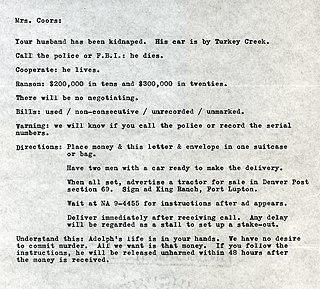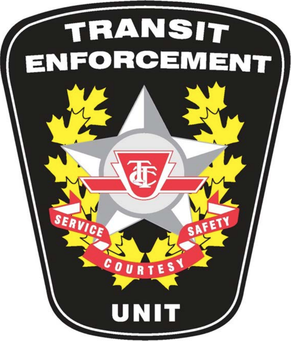
In criminal law, kidnapping is the unlawful confinement of a person against their will, often including transportation/asportation. The asportation and abduction element is typically but not necessarily conducted by means of force or fear: the perpetrator may use a weapon to force the victim into a vehicle, but it is still kidnapping if the victim is enticed to enter the vehicle willingly.

A department of motor vehicles (DMV) is a government agency that administers motor vehicle registration and driver licensing. In countries with federal states such as in North America, these agencies are generally administered by subnational governments, while in unitary states such as many of those in Europe, DMVs are organized nationally by the central government.

A police car is a ground vehicle used by police and law enforcement for transportation during patrols and responses to calls for service. A type of emergency vehicle, police cars are used by police officers to patrol a beat, quickly reach incident scenes, and transport and temporarily detain suspects, all while establishing a police presence and providing visible crime deterrence.

The Transit Enforcement Unit is the transit law enforcement and corporate security unit of the Toronto Transit Commission (TTC) in Toronto, Ontario, Canada. As of May 2019, the TEU employs 80 transit enforcement officers (TEOs), and 100 transit fare inspectors (TFIs).

Law enforcement in Canada is the responsibility of police services, special constabularies, and civil law enforcement agencies, which are operated by every level of government, some private and Crown corporations, and First Nations. In contrast to the United States or Mexico, and with the exception of the Unité permanente anticorruption in Quebec and the Organized Crime Agency of British Columbia, there are no organizations dedicated exclusively to the investigation of criminal activity in Canada. Criminal investigations are instead conducted by police services, which maintain specialized criminal investigation units in addition to their mandate for emergency response and general community safety.
Motorways of Pakistan are a network of multiple-lane, high-speed, controlled-access highways in Pakistan which are owned, maintained, and operated federally by Pakistan's National Highway Authority. At present, 2567 km of motorways are operational, while an additional 1191 km are under construction. Motorways are a part of Pakistan's “National Trade Corridor Project” and “China-Pakistan Belt Road Initiative,” from Khunjerab Pass near the Chinese border to Gwadar in Balochistan. There are a total of 16 motorways, 11 of which are operational, while some are under construction and others are planned.

The drug policy in the United States is the activity of the federal government relating to the regulation of drugs. Starting in the early 1900s the United States government began enforcing drug policies. These policies criminalized drugs such as opium, morphine, heroine, and cocaine outside of medical use. The drug policies put into place are enforced by the Food and Drug Administration and the Drug Enforcement Administration. Classification of Drugs are defined and enforced using the Controlled Substance Act, which lists different drugs into their respective substances based on its potential of abuse and potential for medical use. Four different categories of drugs are Alcohol, Cannabis, Opioids, and Stimulants.

The Kansas Bureau of Investigation (KBI) is the state bureau of investigation of the U.S. state of Kansas. The KBI is a division of the Kansas Attorney General and responsible for providing investigative and criminal laboratory services to criminal justice agencies, as well as investigating and preventing crime in the state of Kansas. Tony Mattivi is the current director of the KBI.
The policies of the United States of America comprise all actions taken by its federal government. The executive branch is the primary entity through which policies are enacted, however the policies are derived from a collection of laws, executive decisions, and legal precedents.
Tags is a Unicode block containing formatting tag characters. The block is designed to mirror ASCII. It was originally intended for language tags, but has now been repurposed as emoji modifiers, specifically for region flags.
Capital punishment in Delaware was abolished after being declared unconstitutional by the Delaware Supreme Court on August 2, 2016. The ruling retroactively applies to earlier death sentences, and remaining Delaware death row inmates had their sentences commuted to life imprisonment. Despite this, the capital statute for first-degree murder under Title 11, Chapter 42, Section 09, of the Delaware Code has yet to be repealed, though it is unenforceable.

Field sobriety tests (FSTs), also referred to as standardized field sobriety tests (SFSTs), are a battery of tests used by police officers to determine if a person suspected of impaired driving is intoxicated with alcohol or other drugs. FSTs are primarily used in the US, to meet "probable cause for arrest" requirements, necessary to sustain an alcohol-impaired driving conviction based on a chemical blood alcohol test.









